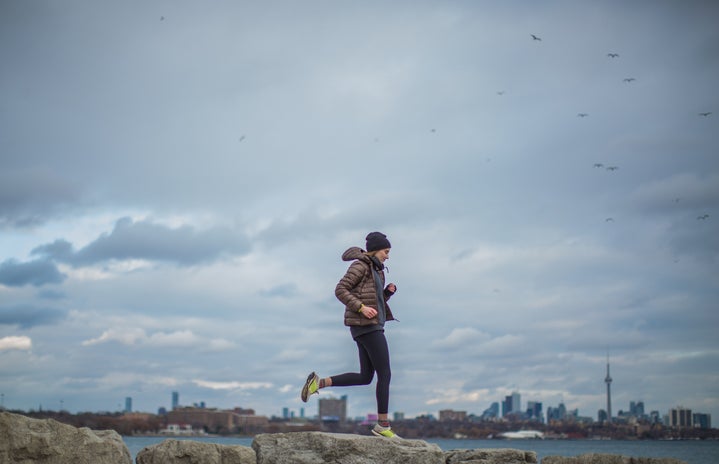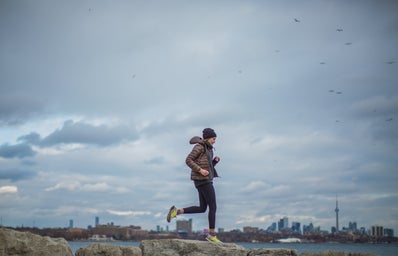I remember being the coach’s daughter on my elementary and middle school soccer teams. My Dad would velcro my shin guards, and I never grew sick of that blissful sensation of peeling them off my sweating skin after a game well played. Year after year I emerged from preseason with intense burns and bruises, but this only strengthened my love and dedication for the sport.
I never associated hustling in my neon cleats with ‘exercise’. As a kid I viewed sports as a social source of joy rather than an opportunity to burn calories. It wasn’t until I was in seventh grade and tried out for one of the most prestigious soccer clubs in New York that I began to see the sport I held so dearly to my heart in a new light.
Practices lasted for two-and-a-half hours, four days a week. We had games every week. I quickly understood that my club coach was a no-nonsense egomaniac whose standards did not falter for any player on his team. From the minute I saw the impeccable skill around me and the screeching, red-faced man on the sidelines, I knew my days as the carefree coach’s daughter were over.
Growing up, I never viewed my body as anything other than a body: a vehicle to ride scooters with my brother through the neighborhood and do cartwheels in the backyard. There were no adjectives to attach to it, no judgments (unless I slipped and scraped my knee or was unable to run down my driveway to get the morning paper with my parents). However, my entrance into a new, harshly critical environment opened my eyes to the limitations of different bodies; a concept I hadn’t yet confronted.
I was never “chubby” growing up, but genetics dictated that I wouldn’t stretch out or properly fill out my body until I reached puberty. This revelation became apparent as I quickly found myself falling behind at soccer practice. I caboosed the pack during “suicide sprints” and heaved over bent knees after every vigorous drill. I had never experienced soccer as anything other than something recreational with friends, and my daily battle with the exhausting club conditioning removed my young rose-colored glasses to the cruel world of “fitness”. The disapproving looks from my teammates and coaches weighed down like a car on my chest as I internalized every ounce of pressure they administered. Suddenly, judgment from others became judgment I projected onto myself. With every extra lap my coach made me run for being last in team sprints, my self worth rapidly descended.
After a year-long struggle as the “less-fit” black sheep of my elite soccer club team, I finally reached puberty the summer before eighth grade, and suddenly my body seemed to fit into the mold society had created for it. The chubby cheeks of my childhood that I had only recently learned to be wary of became high cheekbones, stubby legs elongated. Before i knew it, I was a respectable 5’8. I vaguely recall returning to school that fall and being asked what my “secret” was. Did I spend the summer slaving away at the gym? Had I cut out after school snacks and stuck to “healthy” food?
My first trip to the gym that year, I relived the sensation that had come over me on that unforgiving turf field from seventh grade. As the clock ticked down on the elliptical, I cursed myself for not working hard enough for the calories on the screen. It seemed as though the numbers on the scale couldn’t move fast enough either. It was as though those judgments on my body from others that had previously snapped me out of my cushy, body-unconscious adolescence were now mainly internally sourced from my own subconscious insecurities.
Exercise quickly became a crippling, impulsive routine. I would eat, feel guilty, punish myself on the elliptical for hours, and then restart the process like clockwork. Being a type-A person with a need to excel academically, I was running myself into the ground by juggling school work and my demanding workout schedule. I didn’t run eight miles every day because I wanted to: I did it because I had to. Maybe some part of me resented my seventh grade self who had taught me to look at my body with disgust, or maybe I wanted to prove to everyone that I could do the conditioning and I wasn’t “out of shape”. For the rest of high school I condemned myself to a strict regimen of exercising to compensate for what little food I allowed myself to eat. It was as if the sweat I perspired released that car-like pressure on my chest so that the ten almonds in my stomach wouldn’t make me feel so guilty.
If I did miss a workout, the mirror would suddlendly reflect that soft twelve year old with the red cheeks and the slow legs. I would spend the day in agony, doing the math in my head to equate just how damaging it was to miss that singular workout. Why was it that my entire existence relied on when I could work out to “be okay” again? I could not fathom a world where workouts weren’t six concrete blocks of my week when I could exhaust all of the guilt and insecurities of the day into the pounding of running sneakers into pavement. Therapists over and over told me I needed to slowly wean myself down to four or five days of healthy exercise a week, but healthy exercise to me meant digging my heels in and riding the train of my rigid schedule until the wheels fell off.
It wasn’t until my freshman year of college when I finally burnt myself out: the insufferable amounts of exercise and restriction had obliterated my metabolism, and my constant sleep deprivation was no longer sustainable. If I was going to be able to enjoy a social life and academics at school and be mentally stable, Iwould need to confront my fear of missing workouts. I would need to listen to my body and give it what it needed: a break.
Exercise is now my favorite part of the day for different reasons. There are days when my classes melt together my readings seem to keep piling up. It isn’t until I put my earbuds in and run in my favorite campus park that I can let go of my anxiety and just breathe. Other days, my emotions get the best of me and I feel that heavy welling up inside as if I could break down at the smallest brush of the shoulder. On those days, I might feel like I need a yoga class to ground me and remind me not to get overwhelmed in negative self talk. Other days, I’ll skip the workout entirely, practicing other forms of self care like watching a movie or eating my favorite foods.
Your body will always tell you what it needs; trusting this allowed me to shift the way I viewed exercise. Some days your body will want a vigorous workout to strengthen and lengthen your muscles. Other days, your body will want a rest. This does not mean that you are weak, lazy, or “out of shape,” it simply implies that your body has been working hard for you to make it through the chaotic week. Your body is asking you to reciprocate that dedication and let it recuperate. It took me four years to wake up and not look at exercise as a punishment or impulse, but as a positive component to a healthy-but-happy lifestyle. Just as one work out won’t magically transform you into an Olympic athlete, it is ludicrous to expect that one missed session will make you gain ten pounds.
I keep myself accountable for my relationship with exercise by asking a simple question: Do I really want to work out? This seems basic enough, but a lot of times we feel the need to go to the gym because “everyone else is” or because we may have overindulged over the weekend and the guilt is too much to ignore. Nonetheless, the only way to not resent exercise and to do it because it feels good is to check in with yourself and make sure you’re going because you genuinely feel that is what your body needs.
I had to look at exercise as an enjoyable accompaniment to my health. I still work out frequently and go for those long runs in the park if it feels right, but not because I feel like I need to compensate for anything. I always ask myself: ’What need does exercising fulfill for me today?’ The relationship you create with working out must be tailored to your your body’s (and mind’s) needs. Go for a run outside because it’s a beautiful day and you just found the perfect playlist. Try out a new fitness class with friends because it sounds fun. Skip the gym because it’s snowing and you’d rather cozy up in bed and rent a movie. Exercise because you want to, not because you have to.


